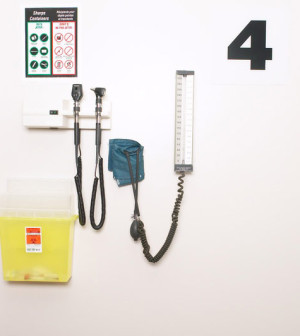- 10 Strategies to Overcome Insomnia
- Could Artificial Sweeteners Be Aging the Brain Faster?
- Techniques for Soothing Your Nervous System
- Does the Water in Your House Smell Funny? Here’s Why
- Can a Daily Dose of Apple Cider Vinegar Actually Aid Weight Loss?
- 6 Health Beverages That Can Actually Spike Your Blood Sugar
- Treatment Options for Social Anxiety Disorder
- Understanding the Connection Between Anxiety and Depression
- How Daily Prunes Can Influence Cholesterol and Inflammation
- When to Take B12 for Better Absorption and Energy
High Blood Pressure During Pregnancy Tied to Newborn Heart Defects

Babies born to moms with a pregnancy complication called pre-eclampsia may have a heightened risk of heart defects, a large new study finds.
The Canadian researchers stressed that the risk is still very low: More serious heart defects were seen in only about 0.1 percent of newborns whose mothers had pre-eclampsia.
And the findings, reported Oct. 20 in the Journal of the American Medical Association, do not prove that pre-eclampsia actually causes those heart problems.
Instead, the results suggest that pre-eclampsia and congenital heart defects share some underlying biological causes, explained Dr. Siobhan Dolan, medical advisor to the nonprofit March of Dimes.
“That’s why this study is important,” said Dolan, who is also a professor of clinical obstetrics and gynecology at Montefiore Medical Center, in New York City.
Dr. Nathalie Auger, the lead researcher on the study, agreed.
“Ultimately, we want to prevent both pre-eclampsia and congenital heart defects,” said Auger, of the University of Montreal.
This is the first study to find an association between the two, Auger pointed out. The hope, she said, is that it will trigger more research to dig into the reasons behind the connection — and potentially find ways to cut the risks of both.
Anywhere from 2 percent to 8 percent of pregnant women develop pre-eclampsia, according to the March of Dimes.
The condition is marked by high blood pressure and other signs that a woman’s organs, such as the kidneys and liver, are not functioning properly. Those signs include protein in the urine, severe headaches and vision problems.
Pre-eclampsia can have serious complications, such as preterm delivery and low birth weight. It also raises a woman’s risk of seizures, coma and placental abruption — where the placenta separates from the uterus, sometimes causing life-threatening bleeding.
The exact cause of pre-eclampsia is unknown, but it’s thought to involve abnormal development in the blood vessels that supply the placenta, Dolan explained.
Pre-eclampsia is typically diagnosed later in pregnancy — after the 20th week, and often in the third trimester. In contrast, the major fetal heart structures take shape early in pregnancy.
So it seems unlikely that pre-eclampsia would be causing congenital heart defects, according to Auger.
Instead, the researchers suggested, underlying problems in new blood vessel development might contribute to both.
The findings are based on medical records from nearly 2 million infants born in Quebec between 1989 and 2012. Close to 73,000 mothers had pre-eclampsia.
Overall, Auger’s team found, infants born to moms with pre-eclampsia had a higher prevalence of “critical” heart defects: Just over 0.1 percent, versus roughly 0.07 percent among babies whose mothers did not have pre-eclampsia.
The higher risk did appear limited to women who’d developed pre-eclampsia earlier — before the 34th week of pregnancy, the findings showed.
On the other hand, pre-eclampsia was linked to milder heart defects regardless of when it arose during pregnancy. About 1.5 percent of babies born to moms with pre-eclampsia had a “non-critical” heart defect, compared with 0.8 percent of other infants.
According to the U.S. Centers for Disease Control and Prevention, critical heart defects account for one-quarter of all congenital heart defects in the United States. The defects typically require surgery or some other treatment within a baby’s first year of life.
“Those are the heart defects we’re really concerned about,” Auger said.
She stressed that women with pre-eclampsia should not be alarmed, since the risk to their baby would still be quite small. But doctors should be aware that there’s a connection, she said.
Heart defects can sometimes be picked up during pregnancy through ultrasound. Other times, Auger said, they’re caught soon after birth through a simple newborn screening test that measures the baby’s oxygen levels.
Both Auger and Dolan said the findings underscore the need for good prenatal care, in part to catch pre-eclampsia as early as possible.
The only cure is to deliver the baby. But if it’s too early in pregnancy for that, women may receive more intensive monitoring or possibly medication, such as a blood pressure drug.
Dolan added that women who’ve had pre-eclampsia in the past are at increased risk of developing it again. So it’s important, she said, for them to talk to their doctors about planning for their next pregnancy.
“Going into pregnancy as healthy as possible is crucial,” Dolan said. “You want to be at a healthy weight. If you have diabetes or high blood pressure, you want to get it under control.”
A doctor might also recommend low-dose aspirin starting around the 12th week of pregnancy, Dolan said, since there is evidence that it cuts the risk of recurrent pre-eclampsia.
Auger also stressed the importance of taking folic acid before and during early pregnancy.
“It’s already recommended for preventing neural tube defects,” she said. “And there is also some evidence that it lowers the risk of congenital heart defects.”
More information
Visit the U.S. Centers for Disease Control and Prevention for more on critical heart defects in newborns.
Source: HealthDay
Copyright © 2026 HealthDay. All rights reserved.










